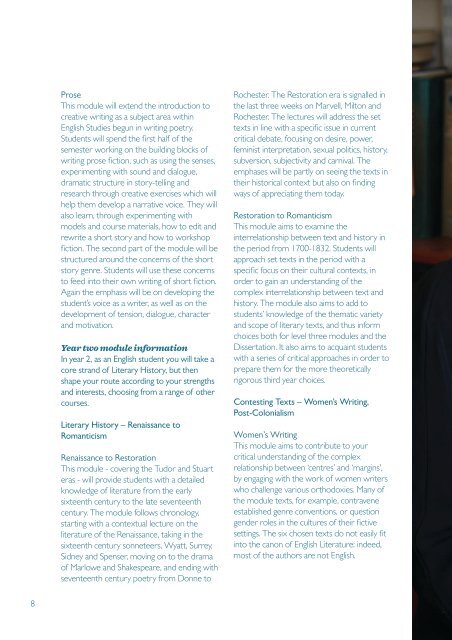ba-hons-english-creative-writing
ba-hons-english-creative-writing
ba-hons-english-creative-writing
You also want an ePaper? Increase the reach of your titles
YUMPU automatically turns print PDFs into web optimized ePapers that Google loves.
Prose<br />
This module will extend the introduction to<br />
<strong>creative</strong> <strong>writing</strong> as a subject area within<br />
English Studies begun in <strong>writing</strong> poetry.<br />
Students will spend the first half of the<br />
semester working on the building blocks of<br />
<strong>writing</strong> prose fiction, such as using the senses,<br />
experimenting with sound and dialogue,<br />
dramatic structure in story-telling and<br />
research through <strong>creative</strong> exercises which will<br />
help them develop a narrative voice. They will<br />
also learn, through experimenting with<br />
models and course materials, how to edit and<br />
rewrite a short story and how to workshop<br />
fiction. The second part of the module will be<br />
structured around the concerns of the short<br />
story genre. Students will use these concerns<br />
to feed into their own <strong>writing</strong> of short fiction.<br />
Again the emphasis will be on developing the<br />
student’s voice as a writer, as well as on the<br />
development of tension, dialogue, character<br />
and motivation.<br />
Year two module information<br />
In year 2, as an English student you will take a<br />
core strand of Literary History, but then<br />
shape your route according to your strengths<br />
and interests, choosing from a range of other<br />
courses.<br />
Literary History – Renaissance to<br />
Romanticism<br />
Renaissance to Restoration<br />
This module - covering the Tudor and Stuart<br />
eras - will provide students with a detailed<br />
knowledge of literature from the early<br />
sixteenth century to the late seventeenth<br />
century. The module follows chronology,<br />
starting with a contextual lecture on the<br />
literature of the Renaissance, taking in the<br />
sixteenth century sonneteers, Wyatt, Surrey,<br />
Sidney and Spenser, moving on to the drama<br />
of Marlowe and Shakespeare, and ending with<br />
seventeenth century poetry from Donne to<br />
Rochester. The Restoration era is signalled in<br />
the last three weeks on Marvell, Milton and<br />
Rochester. The lectures will address the set<br />
texts in line with a specific issue in current<br />
critical de<strong>ba</strong>te, focusing on desire, power,<br />
feminist interpretation, sexual politics, history,<br />
subversion, subjectivity and carnival. The<br />
emphases will be partly on seeing the texts in<br />
their historical context but also on finding<br />
ways of appreciating them today.<br />
Restoration to Romanticism<br />
This module aims to examine the<br />
interrelationship between text and history in<br />
the period from 1700-1832. Students will<br />
approach set texts in the period with a<br />
specific focus on their cultural contexts, in<br />
order to gain an understanding of the<br />
complex interrelationship between text and<br />
history. The module also aims to add to<br />
students’ knowledge of the thematic variety<br />
and scope of literary texts, and thus inform<br />
choices both for level three modules and the<br />
Dissertation. It also aims to acquaint students<br />
with a series of critical approaches in order to<br />
prepare them for the more theoretically<br />
rigorous third year choices.<br />
Contesting Texts – Women’s Writing,<br />
Post-Colonialism<br />
Women’s Writing<br />
This module aims to contribute to your<br />
critical understanding of the complex<br />
relationship between ‘centres’ and ‘margins’,<br />
by engaging with the work of women writers<br />
who challenge various orthodoxies. Many of<br />
the module texts, for example, contravene<br />
established genre conventions, or question<br />
gender roles in the cultures of their fictive<br />
settings. The six chosen texts do not easily fit<br />
into the canon of English Literature: indeed,<br />
most of the authors are not English.<br />
8


